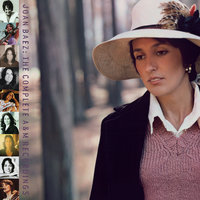| Where Are You Now, My Son? |
|---|
| It’s walking to the battleground that always makes me cry |
| I’ve met so few folks in my time who weren’t afraid to die |
| But dawn bleeds with the people here and morning skies are red |
| As young girls load up bicycles with flowers for the dead |
| An aging woman picks along the craters and the rubble |
| A piece of cloth, a bit of shoe, a whole lifetime of trouble |
| A sobbing chant comes from her throat and splits the morning air |
| The single son she had last night is buried under her |
| They say that the war is done |
| Where are you now, my son? |
| An old man with unsteady gait and beard of ancient white |
| Bent to the ground with arms outstretched faltering in his plight |
| I took his hand to steady him, he stood and did not turn |
| But smiled and wept and bowed and mumbled softly, «Danke shoen» |
| The children on the roadsides of the villages and towns |
| Would stand around us laughing as we stood like giant clowns |
| The mourning bands told whom they’d lost by last night’s phantom messenger |
| And they spoke their only words in English, «Johnson, Nixon, Kissinger» |
| Now that the war’s being won |
| Where are you now, my son? |
| The siren gives a running break to those who live in town |
| Take the children and the blankets to the concrete underground |
| Sometimes we’d sing and joke and paint bright pictures on the wall |
| And wonder if we would die well and if we’d loved at all |
| The helmetless defiant ones sit on the curb and stare |
| At tracers flashing through the sky and planes bursting in air |
| But way out in the villages no warning comes before a blast |
| That means a sleeping child will never make it to the door |
| The days of our youth were fun |
| Where are you now, my son? |
| From the distant cabins in the sky where no man hears the sound |
| Of death on earth from his own bombs, six pilots were shot down |
| Next day six hulking bandaged men were dazzled by a room |
| Of newsmen. |
| Sally keep the faith, let’s hope this war ends soon |
| In a damaged prison camp where they no longer had command |
| They shook their heads, what irony, we thought peace was at hand |
| The preacher read a Christmas prayer and the men kneeled on the ground |
| Then sheepishly asked me to sing «They Drove Old Dixie Down» |
| Yours was the righteous gun |
| Where are you now, my son? |
| We gathered in the lobby celebrating Chrismas Eve |
| The French, the Poles, the Indians, Cubans and Vietnamese |
| The tiny tree our host had fixed sweetened familiar psalms |
| But the most sacred of Christmas prayers was shattered by the bombs |
| So back into the shelter where two lovely women rose |
| And with a brilliance and a fierceness and a gentleness which froze |
| The rest of us to silence as their voices soared with joy |
| Outshining every bomb that fell that night upon Hanoi |
| With bravery we have sun |
| But where are you now, my son? |
| Oh people of the shelters what a gift you’ve given me |
| To smile at me and quietly let me share your agony |
| And I can only bow in utter humbleness and ask |
| Forgiveness and forgiveness for the things we’ve brought to pass |
| The black pyjama’d culture that we tried to kill with pellet holes |
| And rows of tiny coffins we’ve paid for with our souls |
| Have built a spirit seldom seen in women and in men |
| And the white flower of Bac Mai will surely blossom once again |
| I’ve heard that the war is done |
| Then where are you now, my son? |
Lyrics Where Are You Now, My Son? - Joan Baez

Song information On this page you can read the lyrics of the song Where Are You Now, My Son? , by -Joan Baez
Song from the album: The Complete A&M Recordings
In the genre:Поп
Release date:31.12.2002
Song language:English
Record label:Interscope Geffen (A&M), Universal Music
Select which language to translate into:
Write what you think about the lyrics!
Other songs by the artist:
| Name | Year |
|---|---|
| 2002 | |
| 1989 | |
| 2002 | |
| 2014 | |
| 2009 | |
| 2009 | |
| 2004 | |
| 1989 | |
| 2010 | |
| 2004 | |
| 2005 | |
| 1974 | |
| 2002 | |
| 2005 | |
| 1989 | |
| 2005 | |
| 1989 | |
| 2005 | |
| 2002 | |
| 2002 |